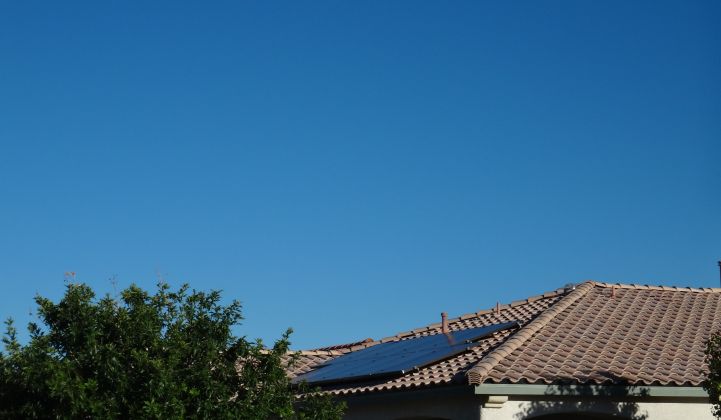The Technical Advisory Committee on Distributed Generation and Storage, a part of Nevada Governor Brian Sandoval's New Energy Industry Task Force, passed a motion Wednesday to grandfather solar customers onto the state's previous solar rules for 25 years.
The decision applies to residential customers who submitted solar applications prior to December 31, 2015. Nevada utility regulators implemented new, less favorable rates for solar on January 1, 2016. The order implements new fixed fees and lowers the net metering credit solar customers receive for excess generation over a period of 12 years. The changes were applied to both new and existing solar customers.
The motion passed by the technical committee is the first of several steps that must be taken to restore old rates to current solar customers. Next Thursday, the motion will go before the full Energy Industry Task Force. If approved, the Task Force will issue the grandfathering recommendation to Governor Sandoval.
The recommendation will be one of several bill draft requests that the governor will consider introducing in an energy bill next legislative session. The Task Force's deadline for sending bill draft requests to the governor's office is June 1, 2016. The Nevada legislature meets every two years, with the next session set to open in February 2017.
Grandfathering isn't the only energy-related issue under consideration. Sandoval issued an executive order to reconvene the New Energy Industry Task Force in January with the broad charge to provide input on "the best energy policies for Nevada's future." Technical advisory committees were formed to address clean energy sources and grid modernization, in addition to distributed generation. The committees are made up of experts from across the energy landscape, including representatives from utilities, environmental groups, local government and private companies.
Separate from the bill draft requests, the Task Force is also required to submit a report with a more all-encompassing set of recommendations for rooftop solar and net metering by September 30. The report will respond to a wider set of policy concerns around how the Nevada rooftop solar market will evolve going forward. The technical committee on distributed generation addressed some of these concerns in a public meeting on April 14 (minutes).
Chandler Sherman, deputy campaign manager at the Bring Back Solar Alliance, which is led by SolarCity, said findings in the September report could be worked into future legislation.
Rooftop solar companies, many of which laid off staff or left Nevada completely after the new rates were put in place, are hoping that lawmakers will reinstate a retail-rate net metering policy, or approve a tariff that factors in both the costs and benefits of distributed solar. While the discussion on grandfathering is a positive development, Sherman said, she also acknowledges that reviving the Nevada rooftop solar market will require a larger set of policy changes.
"We are encouraged that the governor is prioritizing looking at rooftop solar as part of Nevada's energy future, and we're grateful he has appreciated the importance of protecting existing customers and restoring confidence in investments already made in solar," she said. "But righting this wrong doesn’t bring the solar industry back to Nevada. We're looking forward to what the energy task force will propose around restoring solar rules that will bring the industry back."
As work in the task force continues, the Bring Back Solar Alliance is spearheading a ballot measure through its subsidiary the No Solar Tax PAC, which would restore favorable rates for solar customers. However, the pro-rooftop-solar group has had to change its approach after NV Energy backed a lawsuit against the campaign in February.
In March, a judge blocked the ballot measure, preventing it from going before voters on the November election ballot. The No Solar Tax PAC has filed an appeal with the Nevada Supreme Court and continues to collect signatures of support of a referendum, in the event it wins the case. At the same time, the group is pursuing an indirect ballot initiative, which must first be considered by the state legislature.
This story was updated to note that there is a pathway for findings from the Task Force report due September 30 to be included in future legislation.



